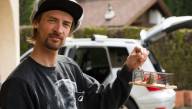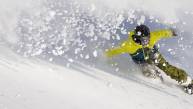tags:
Whistler, BC, Canada |
yes snowboards |whistlerblackcomb |whistler backcountry |vancouver island surf |surfing |high fives |freeride snowboarding |dcp |costa rica |british columbia |backcountry freestyle
Quebecois pro snowboarder David Porcheron, known the world over as DCP, made the leap from competing in pipe to spinning off cliffs in the early 2000s. Fifteen years and two kids later, DCP weighs in on fatherhood, filming, fear management, and how he splits time between shredding British Columbia and surfing Costa Rica.
You split your time between surfing and snowboarding. Can you talk about how you logistically and financially make that happen?
 DCP shows evidence of faceshots all day. Paul Morrison/Whistler/Blackcomb photo.
DCP shows evidence of faceshots all day. Paul Morrison/Whistler/Blackcomb photo.
The ultimate would be to live somewhere you can surf and snowboard everyday, in the same day. But I certainly feel very fortunate of the lifestyle I have been able to live for many years, and I was fortunate to be able to buy and build a house in Costa Rica along with a business partner. We both share our times with our families down there, and the rest of the time we try renting it.
We rent it enough to pay the maintenance and bills on the house, and the goal is to get enough rentals to pay the trip every summer for the whole family. That's how we'll be able to go back every year for summer vacation (See DCP's Costa Rica surf spot).
When I'm in Squamish, the mountains are right there, and the Whistler mountains and backcountry access is unlimited. Yet Vancouver Island offers amazing waves.
It's easy to camp or sleep in your car. Ultimately, a camper van would be the best for island surf with the family.
Both snowboarding and surfing are dictated by Mother Nature. The wind, the amount of pow, the swell–in freeriding and surfing makes every run different. It makes it difficult to be at the right place at the right time. But when you are, it's magic. It's what you are looking for. The challenge makes it fun.
I love the mystical element of surfing and freeride snowboarding. Being in the ocean, or in the mountains, is quite an adventure on its own. That's what attracts me and keep me wanting more, and wanting to share this lifestyle with my kids.
Can you talk about how you approach surfing? How does your mental approach differ from snowboarding? Does a great day of surfing or riding mean different things for you? Is there a spiritual connection between the two?
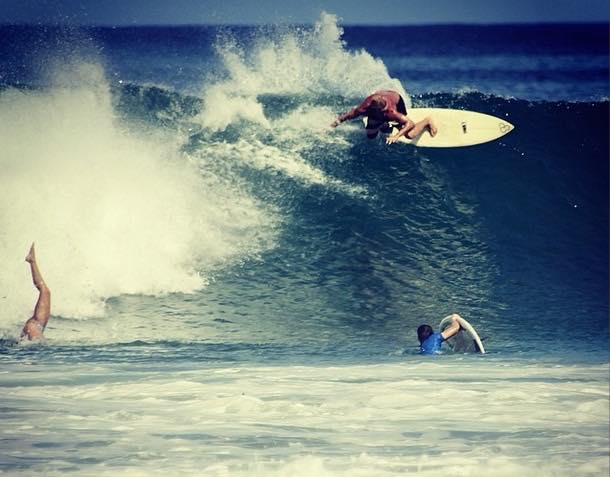 DCP threads the needle in Costa Rica. Photo via DCP's Instagram.
DCP threads the needle in Costa Rica. Photo via DCP's Instagram.
Well, I'm a pro snowboarder, and an average, passionate surfer. When I snowboard, I get a thrill out of riding semi-dangerous situations, or at least steeper, deeper terrain. I love catching air and going fast. But I also have a strategic and careful approach. I want to be able to ride another day. I love to push myself, but I'll still only ride something if I know I'll be able to ride out of it.
I feels like when I started snowboarding, and I used to hike halfpipes in Quebec all day. Well, now I'll surf for eight hours in row, no problem, just cause I'm getting more waves and riding them better. It’s the same feeling I had when I was younger.
Every time is a great experience.
More often then not, it's very spiritual. It's my meditation. It's my peace. It's how I balance my everyday life: the hustling, parenthood, and grown-up responsibilities.
When I'm sitting in the water, gliding down a wave, or standing on top of a line, or even hiking it, that's when I'm able to connect with nature, with myself, with my true feelings and intentions. A daily dose of any of these activities, including skateboarding, works for me.
When shared with friends or family members, the level of fun gets higher, but the spiritual part comes often in those lonely moments when you’re truly able to connect with the moment at hand.
Now it's fairly natural for park riders to transition to backcountry freestyle. However, when you did it, snowboard industry sponsors didn't uniformly support this move. Can you talk about what prompted you to make this transition, what your experience was, and how that might be different than up-and-coming pros?
 Though known for technical tricks and big airs, DCP promotes style over massive spins. Paul Morrison/Whistler/Blackcomb photo.
Though known for technical tricks and big airs, DCP promotes style over massive spins. Paul Morrison/Whistler/Blackcomb photo.
I've always been a big fan of doing what you love and enjoy doing. I've competed in many halfpipe, big air, and slopestyle contests. I've had my successes and my difficulties, but I feel like I’ve lived through the best time in snowboarding.
I had lots of fun competing, and then I started filming and exploring the backcountry options of building jumps and patting down step-down jumps. It became what really inspired me and where I had the most fun.
I was always inspired by guys like Craig Kelly, Terje Haakonsen, Michi Albin, and Bryan Iguchi. Through my years of seeing their approach to the backcountry, they opened up the gates for many of us.
One day, in Park City, there was a qualifier for the 2002 Olympics, and I fell on my first run and didn’t advance to the second round. I jumped in a cab, met up with Shane from Kingpin Productions, hiked up Solitude, and built a pow jump and went bigger than I would have gone all day in the pipe contest.
The contest before, in France, I was fined for dropping in after practice ended, which I did because I was already strapped in and I had hiked up already.
That’s when things started and continued to not being any fun. That’s when I quit competing and focused on being in the mountains day-in and day-out.
I think this new generation of kids can do anything. They are very smart and willing, and driven. They’re are very lucky to have all those parks, indoor training camps, and skateparks. They have access to so much amazing product on the market, too.
Add to this the social media immediate-info format. You have a guy throwing down a triple cork and you get to watch it online 20 minutes later–you don’t have to wait till the movie comes out in September to see it.
With all the set ups and the access and connectiveness of people, the progression is fast, and I’m stoked to see that. I hope style never gets out of the picture, because spinning three or four times around is not the ultimate feeling in snowboarding; at least, I don’t think it is. I think it’s laying into a deep powder turn going mach speed and tweaking and holding a grab while slowly spinning a 180 off a big drop or a jump into pow.
How does having a family affect your mindset when you approach riding in the backcountry? How do you measure risk while being a father and a husband?
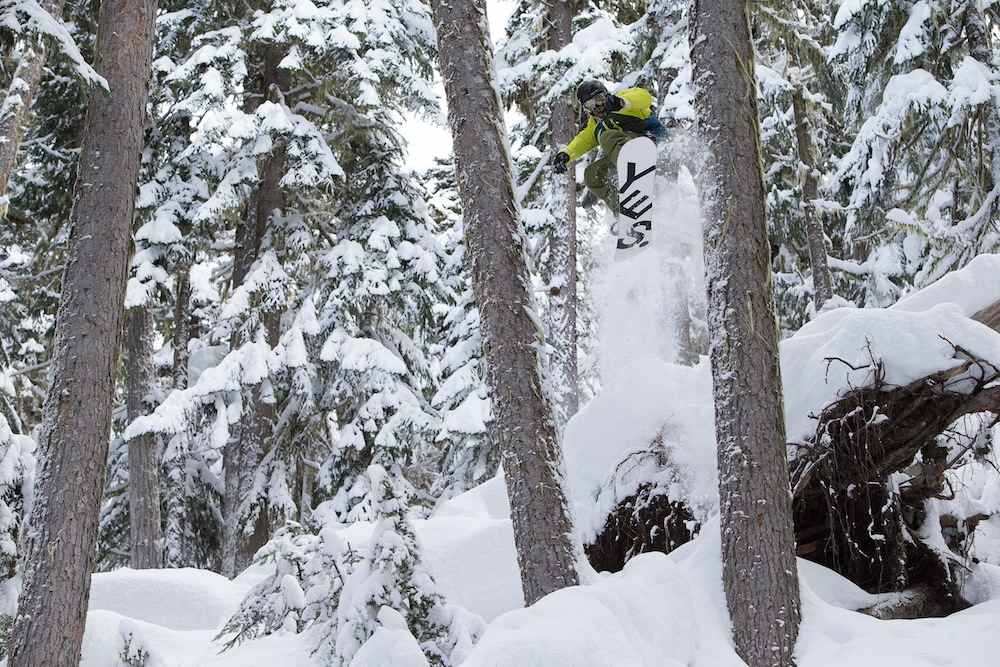 Husband and father of two, DCP balances the responsibilities of parenthood and filming high-consequence, backcountry lines. Paul Morrison/Whistler/Blackcomb photo.
Husband and father of two, DCP balances the responsibilities of parenthood and filming high-consequence, backcountry lines. Paul Morrison/Whistler/Blackcomb photo.
Well honestly, I’ve always been cautious of my choices while snowboarding, and I don’t think snowboarding is more dangerous then riding my bike around town and around cars while drivers are texting. But having a family and being loved like that is definitely a bit of a mindset change.
I certainly, without a doubt, want to come home after a trip or after a day out in backcountry–every time–so I plan accordingly and make the right choices depending on the conditions and the feelings.
But, I’m very passionate about snowboarding, and I love to get after it. My wife is as well, and she knows what I’m after. We are the same in that regard. We need our snowboarding time or our surfing time. We have our kids snowboarding now, too, and loving powder, so they know the passion, too.
Although two years ago, when we lost our friend, our kids’ uncle Joe Timlin, in an avalanche in Colorado. Now my daughter gets a bit scared about me going snowboarding. So we’ve had to talk about it a lot. We are still working on all those emotions. My family is supportive, though.
Why did you start Yes. Snowboards? Can you talk about your company's philosophy?
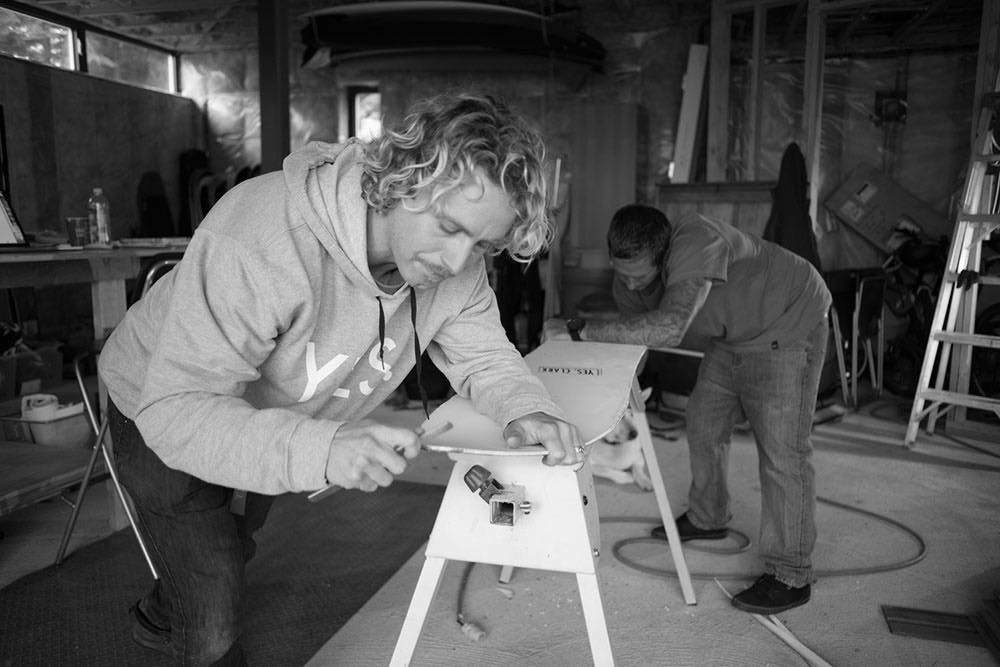 In the Yes. Snowboards factory on the new Clark shape-your-own snowboard. Phil Tifo photo via Yes. Snowboards.
In the Yes. Snowboards factory on the new Clark shape-your-own snowboard. Phil Tifo photo via Yes. Snowboards.
My friends, JP Solberg, Romain di Marchi, and I started Yes. Snowboards after being let go of a long-term sponsorship deal with Burton. The three of us wanted to keep living this life we loved, and wanted to snowboard more and keep pushing ourselves and the sport of snowboarding. We figured, 'Why not have our own board brand?'
With Yes. Snowboards, we're able to design the boards we want to ride, that our team wants to ride; the boards that we think other people would also love riding.
We are offering lots of technology and great board quality, and a lifetime warranty for a very competitive price. We are inspired by surfing and skateboarding, we appreciate and respect street riding a lot, and at the same time we think powder snowboarding is the ultimate ride, and that’s why we build the boards we build.
Yes. is not only a snowboarding brand; yes. is a positive movement where we believe you can achieve anything! We believe we can turn any day on the hill into the best day of the season.
Yes. is about the love and the passion of snowboarding which motivated us to start our own brand, to allow ourselves to keep connected with the snowboarding industry, and hopefully, to give back to snowboarding. It’s given us everything we are, and we are so grateful for this.
How do you approach a big, high-consequence line? Can you talk about your process before, during and after a line?
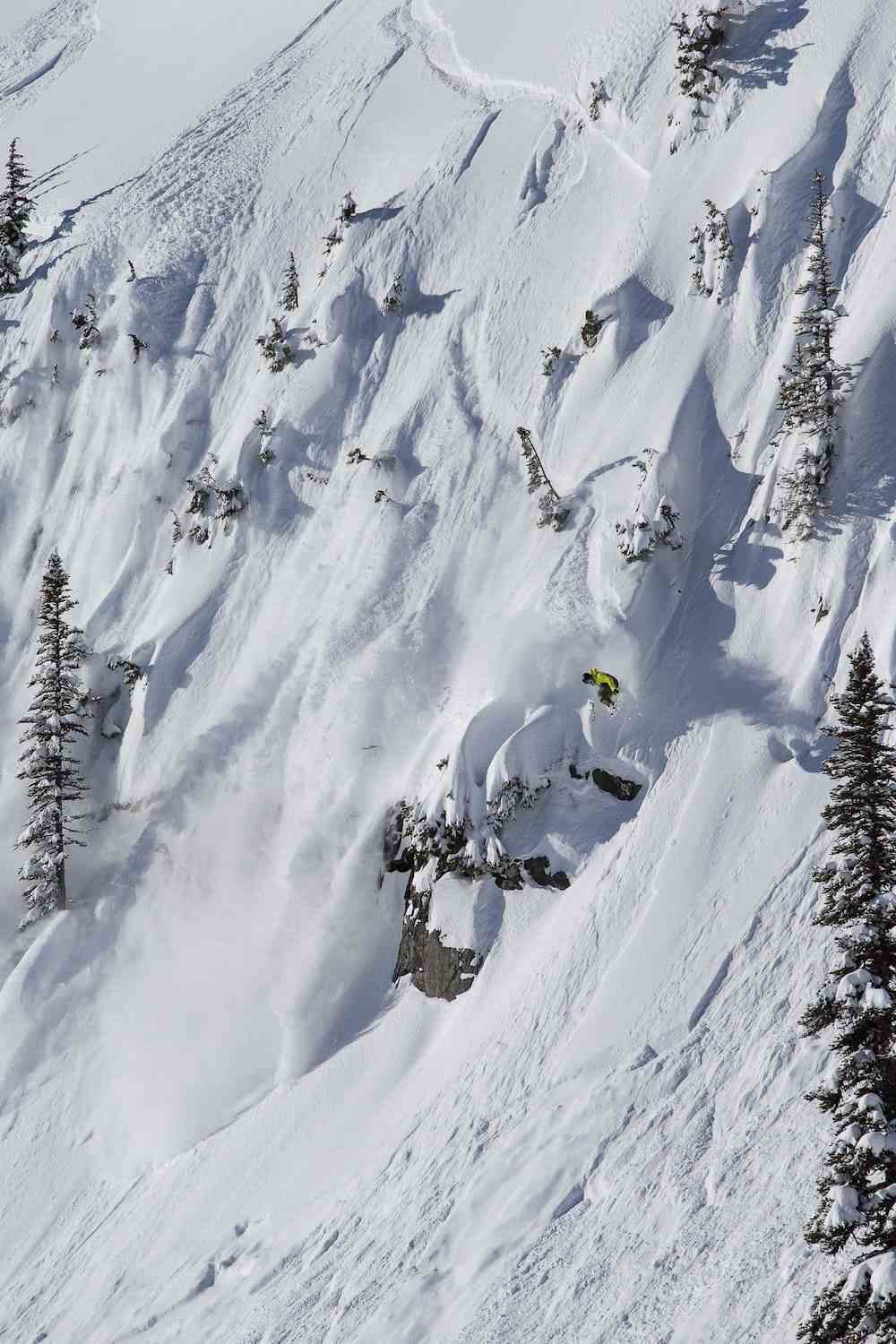 DCP demonstrates some superb sluff management in the BC backcountry. Paul Morrison/Whistler/Blackcomb photo.
DCP demonstrates some superb sluff management in the BC backcountry. Paul Morrison/Whistler/Blackcomb photo.
Before I ride a big line, I make sure the conditions are going to be safe to ride. I'll consider all my options and exits. I'll definitely make sure I have got a good photo of the line because, from the top, your line always looks different. With experience and a good photo that you can look at, locating yourself is easier.
I need to breathe more. Once I'm about to drop in, I usually have this crazy cough. I think it's related to anticipation stress, but I'm not sure. But if it's a line with big consequences, I've got to breathe deeper to avoid having that cough take over.
I need to breathe more. Once I'm about to drop in, I usually have this crazy cough. I think it's related to anticipation stress, but I'm not sure. But if it's a line with big consequences, I've got to breathe deeper to avoid having that cough take over.
Once I'm ready to commit and drop, that fear is gone.
I'm confident. I'm riding the line with my exit and my slough in mind. I go fast. I'm in ecstasy. I'm slashing pow, going mach speed. I'm catching air. It's amazing. I love the very intense focus I get into while filming, and even more when filming big, high-consequence lines.
Once you ride away from the line, you look back. You are safe, and it was sweet. The mountain is still sloughing, shedding. It's a very good feeling. All that combined makes you wanna keep going, despite family and the schedule. That's where you need to find a balance that works for you and your loved ones.
Why did you chose British Columbia as a base?
 Cliff drop to nose grab. Paul Morrison photo.
Cliff drop to nose grab. Paul Morrison photo.
Being from Quebec, the bigger mountains and coastal snowpack was the number one reason to live in British Columbia. The history, the people that are living around here, the beautiful and wave-rich coast of BC, the lakes, hiking, rock climbing, mountain biking, eagles, the Sea-to-Sky Highway, the great education for my kids, and Whistler Blackcomb is what keep me there.
I like that everyone here is getting after it, and doing something when they're not working. Everyone is good at something and takes it to the extreme–and their kids are usually right behind them, too!
I love Quebec. My grandma, my sister and brothers, Mom and Dad are there. But my lifestyle is more easily achieved living where I do. I would love to see my family more, that's for sure, but I guess that's the biggest sacrifice.
Where do you see your riding going in the future? What else do you want to achieve?
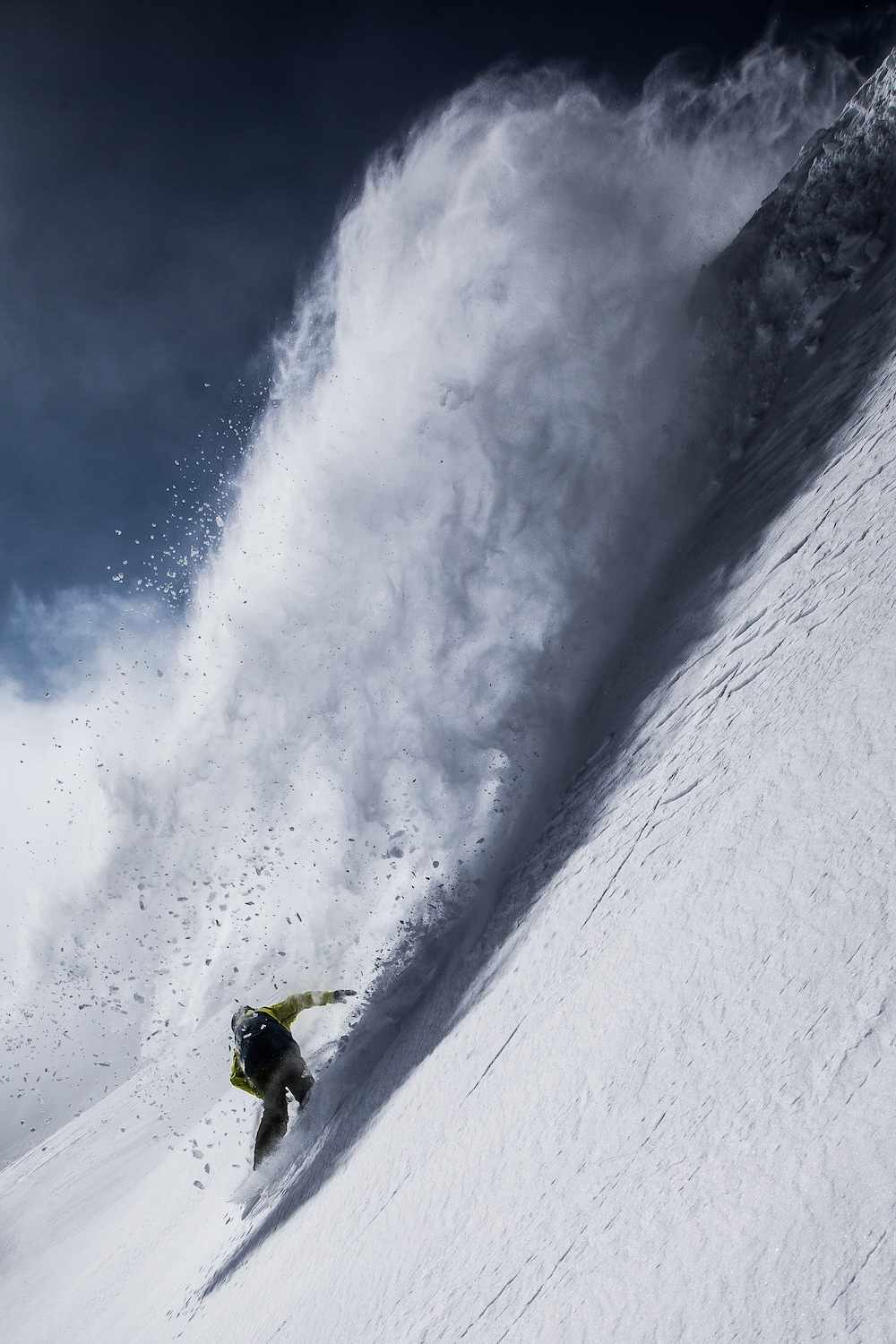 DCP slashes a steep, soft runout. Paul Morrison photo.
DCP slashes a steep, soft runout. Paul Morrison photo.
I'm co-producing a film this year called Balance (Check out @thebalancemovie), which is about surfing, skateboarding, and snowboarding. I'm still gonna be doing some fall line, freestyle snowboarding, and hitting a few jumps.
I want to ride with my kids and wife as well as much as I can in the coming months before the busy filming season. I love to see my kids progress and get the bug for winter.
I would also love to inspire people to pick up snowboarding as a meditative activity rather then a physical activity, if that's what you are seeking, because it can truly be a perfect mix of both.
Snowboarding is not about how much you are spinning, unless it’s your true aspiration, but you gotta think about snowboarding as this freedom, this creativity, this feeling of being so in the moment and connected with your board and the snow and the terrain that it feels effortless.
Snowboarding is that, and that's the fun and the satisfaction you get out of it. The break from it all, if you need that break, or the glue to put it all together.
Check out the video profile of DCP and his family in Whistler’s Beyond Series (above at the top of the page), and look out for Balance dropping in fall 2015.




